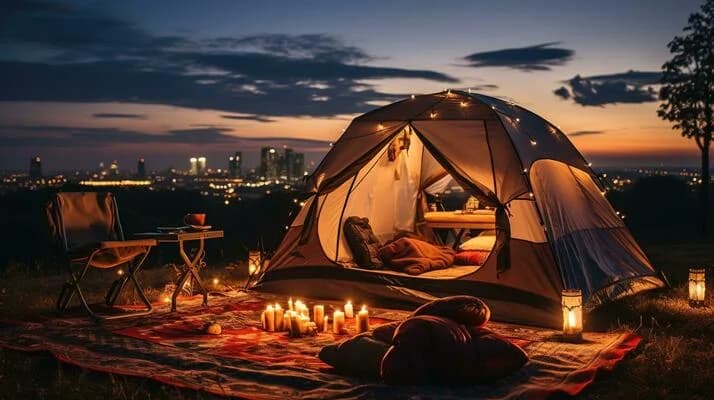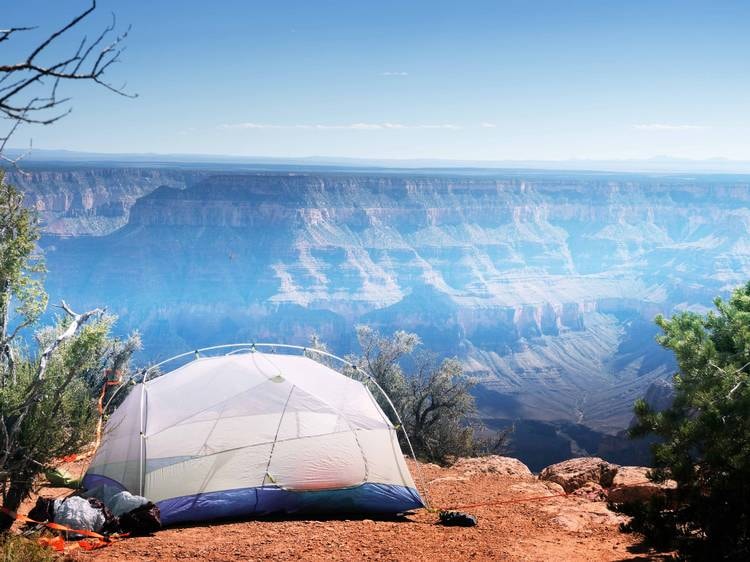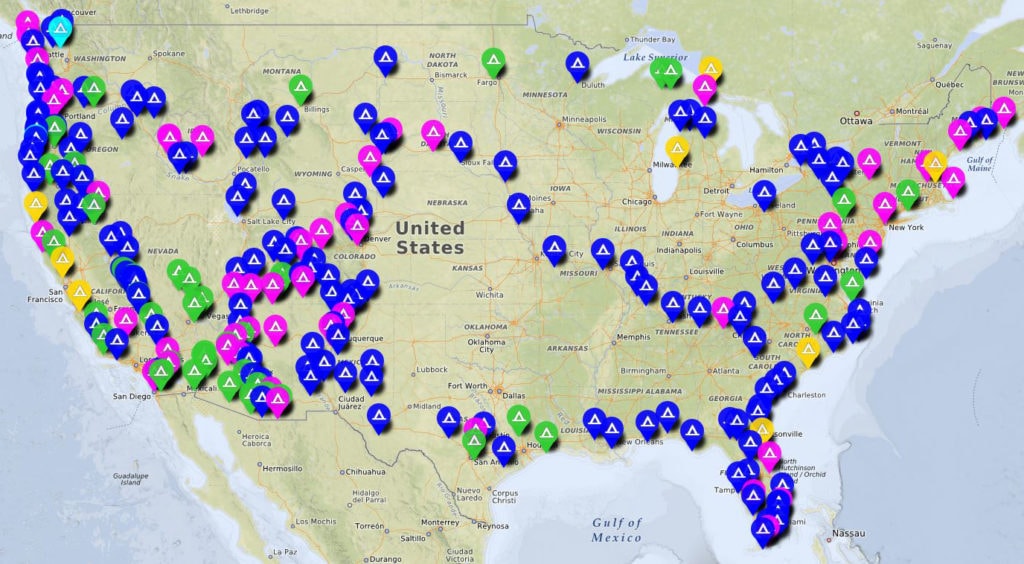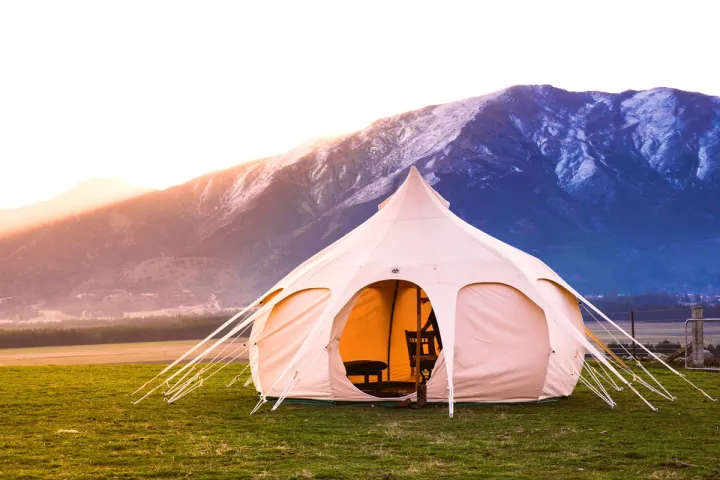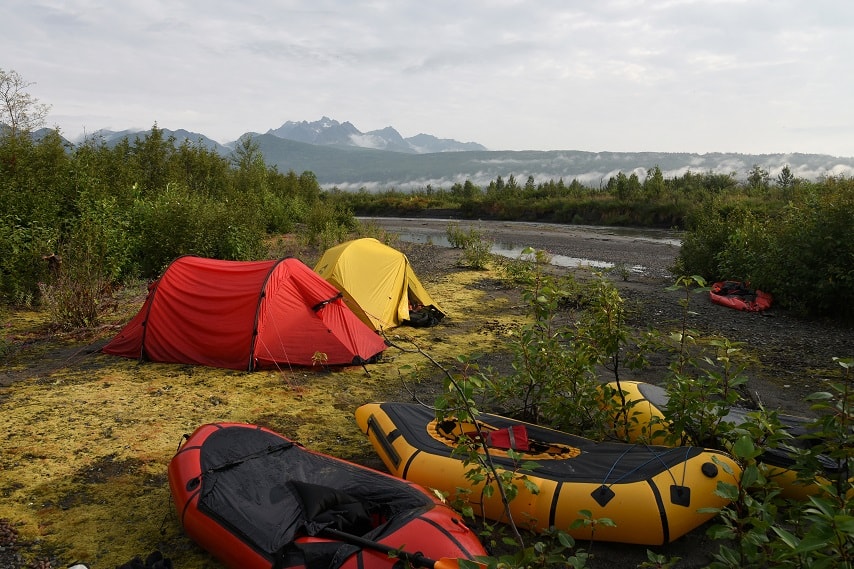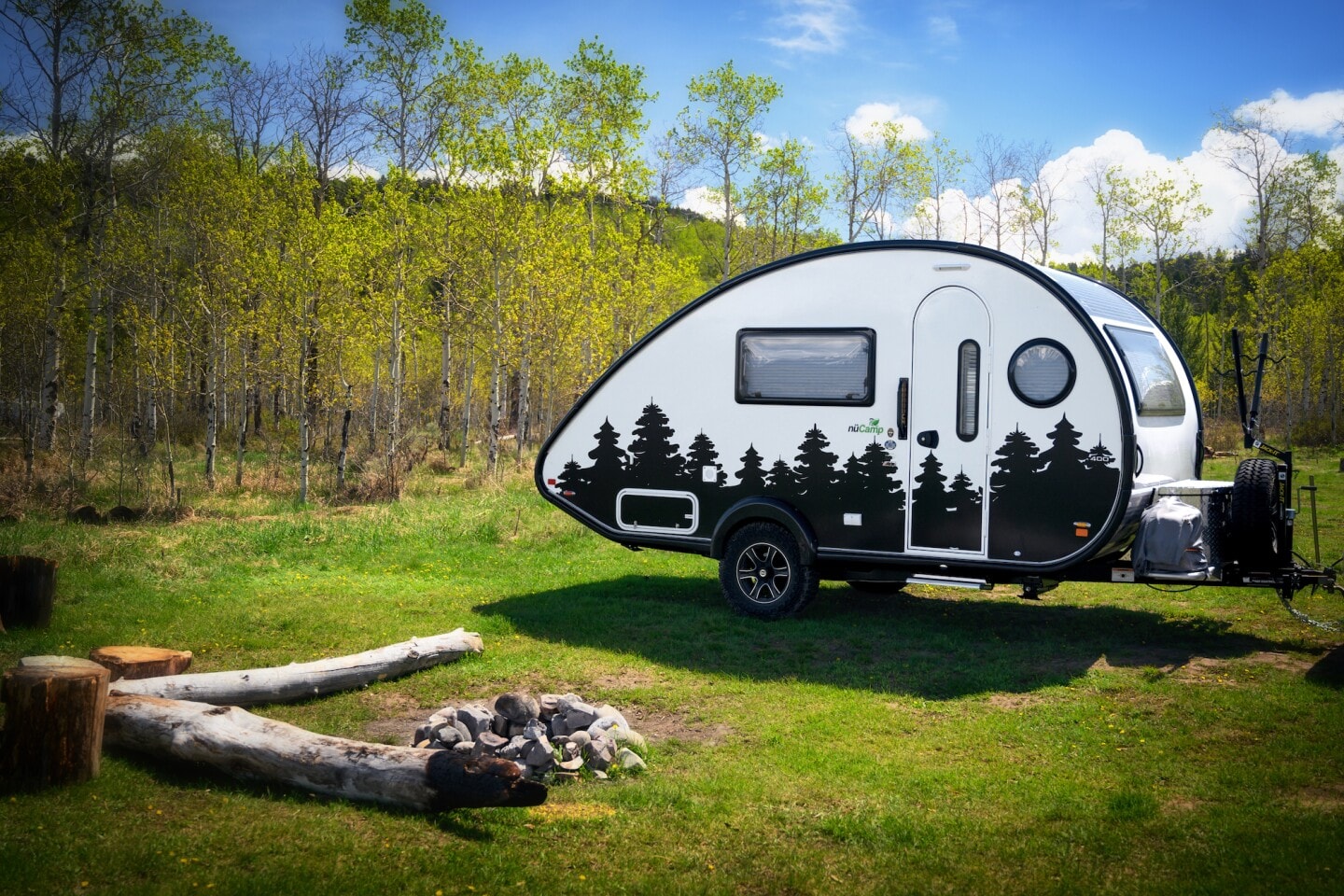Note: This post contains Amazon affiliate links. We may earn a commission from purchases at no extra cost to you. Thanks for supporting our blog!
Of course, camping isn’t for everyone. If you want complete comfort, we advise you not to read this article. For the rest of you, take the first step with this text and discover the magical world of camping!
Camping can be best described as a unique way to relax and enjoy nature. Many have already discovered this form of relaxation and fun, while others get stuck on the first hurdle—choosing a location or lacking equipment.
We believe you don’t need to invest a lot to enjoy camping. Instead, it’s more important to find the right location that fits your budget and character. So let’s start with some simple tips to help you decide on your first summer in a tent and embark on an exciting trip that should be on everyone's bucket list. Experienced campers, please share your thoughts in the comments on anything you disagree with or that we may have forgotten to mention.
Before booking your spot, research different locations and decide what suits you best
When planning a hiking trip or camping adventure, choosing the right location is crucial to ensure a pleasant and memorable experience. While cities like Tokyo, New York City, Rome, Paris, and Dubai offer vibrant urban experiences, camping locations provide a contrasting escape into nature. The ideal spot will depend on your preferences, whether you seek solitude in nature, proximity to exciting activities, or access to tourist attractions. Here’s a guide to help you research and decide on the best location for your next outdoor adventure.
Determine Your Preferences
Before booking your spot, it's essential to determine what kind of experience you want. Here are some factors to consider:
-Peace: If you crave tranquility, look for campsites near national parks, forests, or remote areas. These locations typically offer serene environments where you can relax, enjoy nature, and escape the hustle and bustle of everyday life. Campsites in these areas are often less crowded, providing a more intimate connection with nature.
- Activities and Proximity to the Beach: If you prefer a more active trip with access to amenities and recreational activities, consider campsites within tourist complexes or towns. These spots often provide easy access to beaches, water sports, hiking trails, and other attractions. You'll find plenty of opportunities for socializing and participating in organized activities.
- Family-Friendly Options: If you’re traveling with family, especially children, look for campsites that offer kid-friendly amenities and activities. Many campsites have playgrounds, swimming pools, and organized games that can keep children entertained and safe.
- Adventure and Exploration: For those who love adventure, choose locations with diverse landscapes and challenging trails. National parks and mountainous regions offer various hiking, rock climbing, and wildlife-watching opportunities. Research the difficulty level of nearby trails to ensure they match your fitness and experience level.
Choose the Right Location
Research Locations
Once you have a clear idea of your preferences, start researching potential locations. Here are some steps to help you find the perfect spot:
- Use Online Resources:
- Campsite Websites: Many campsites have websites with detailed information about their facilities, activities, and nearby attractions. Look for reviews and photos to get a better sense of what to expect.
- Travel Blogs and Forums: These platforms are excellent sources of firsthand experiences from other campers. You can find recommendations, tips, and insights that might not be available on official websites.
- Maps and Apps: Use online maps and camping apps to explore different areas. These tools often show nearby attractions, hiking trails, and amenities.
2. Check Availability and Accessibility:
- Reservations: Popular campsites can fill up quickly, especially during peak seasons. Check availability and make reservations in advance to secure your spot.
- Accessibility: Consider how easy it is to reach the campsite. Some remote locations might require off-road vehicles or long hikes, while others are accessible by car.
3. Consider Amenities and Facilities:
- Basic Amenities: Ensure the campsite has essential facilities like restrooms, showers, and potable water. These can significantly impact your comfort during the trip.
- Extra Amenities: Depending on your preferences, look for campsites that offer additional amenities such as picnic tables, fire pits, Wi-Fi, and electricity.
Evaluate Nearby Attractions
When choosing a campsite, consider the attractions and activities available in the surrounding area:
- Natural Attractions: Proximity to natural attractions like waterfalls, lakes, and scenic viewpoints can enhance your camping experience. Research nearby hiking trails, wildlife reserves, and natural landmarks. For example, the Empire State Building is an iconic tourist attraction in New York City, offering panoramic views of Manhattan's skyscrapers and the city's skyline.
- Cultural and Historical Sites: Some campsites are located near historical towns, museums, or cultural sites. These can add an educational and enriching dimension to your trip.
- Adventure Activities: If you’re an adventure enthusiast, look for locations that offer activities like kayaking, mountain biking, rock climbing, and zip-lining.
Seasonal Considerations
The time of year can greatly influence your camping experience:
- Weather: Research the typical weather conditions for the season you plan to visit. Ensure you pack appropriate clothing and gear for the expected temperatures and weather conditions.
- Crowds: Some locations can be very crowded during peak seasons, which might detract from your experience if you prefer solitude. Consider visiting during the off-season for a quieter experience.
- Flora and Fauna: Different seasons offer varying opportunities to see wildlife and blooming flora. Research the best times to visit if you’re interested in specific natural phenomena.
Plan for Safety
Safety should always be a priority when choosing a campsite:
- Emergency Services: Ensure the campsite is within a reasonable distance from emergency services like hospitals and ranger stations.
- Local Wildlife: Research the local wildlife and any precautions you need to take, such as storing food properly to avoid attracting animals.
- Health and Safety Regulations: Make sure the campsite adheres to health and safety regulations, including fire safety and sanitation standards.
Make a Decision
After thorough research and considering all the factors, choose the location that best suits your preferences and needs. Remember, the perfect campsite will vary from person to person, so prioritize what matters most to you.
By taking the time to research and decide on the best location for your camping or hiking trip, you’ll ensure a more enjoyable and fulfilling experience. Whether you seek peace, adventure, family fun, or a mix of everything, there’s a perfect spot out there waiting for you.
Quality camping gear is essential for a comfortable and safe stay in nature. The most important items to bring are a tent, sleeping bag, mat or mattress, flashlight, cooking utensils, dishes, and hygiene products.
Also, don't forget to bring enough clothes, especially for cooler nights. If you don't know where to start, visit a specialized store where you can find everything you need for your first camping trip.
Remember, you don't need to have everything the first year. Invest in a good tent, borrow an air mattress, and let your first chair be the first log you find. We’re exaggerating, but you get the idea.
Choose the Right Tent
Choosing the right tent is crucial for a comfortable and enjoyable camping experience. The tent you select should suit your specific needs, preferences, and the conditions of your camping location. Here are some key factors to consider when choosing the right tent:
Size and Capacity
- Occupancy: Tents come in various sizes, typically ranging from one-person to family-sized tents. When choosing a tent, consider the number of people who will be sleeping in it. A tent labeled as a "4-person tent" may fit four people snugly, but if you want extra space for comfort or gear storage, consider sizing up.
- Floor Space: Check the floor dimensions to ensure there's enough room for sleeping bags, air mattresses, and your gear. Remember, a bit of extra space can make a big difference in comfort.
- Height: If you prefer being able to stand up inside your tent, look for tents with a higher peak height. Cabin-style tents often offer more headroom compared to dome tents.
Type and Design
- Dome Tents: These are popular for their simple setup and stability in windy conditions. They are usually lightweight and compact, making them ideal for backpacking and short hikes.
- Cabin Tents: These tents provide more vertical walls and higher ceilings, offering more interior space. They are great for families or groups who want a more spacious living area.
- Tunnel Tents: These offer a good balance between space and stability. They are often used for longer stays and in various weather conditions.
Room Configuration
- Single-Room Tents: Ideal for solo campers or couples, these tents are straightforward to set up.
- Multi-Room Tents: If you’re camping with family or a larger group, consider tents with two or more rooms. These offer privacy and can be especially useful if you have children or want to separate sleeping areas from gear storage.
- Vestibules and Porches: Some tents come with added vestibules or porches, which are useful for storing gear, cooking, or relaxing outside the main sleeping area.
Weather Conditions
- Three-Season Tents: Designed for spring, summer, and fall, these tents provide good ventilation, and rain protection, and are generally lighter in weight.
- Four-Season Tents: Built to withstand harsh winter conditions, these tents are sturdier and provide better insulation. They are ideal for camping in snowy or windy environments but are usually heavier and more expensive.
Setup and Portability
- Ease of Setup: Look for tents with a straightforward setup process, especially if you’re a beginner. Many modern tents come with color-coded poles and intuitive designs that make pitching them easier.
- Weight and Packed Size: Consider how portable the tent needs to be. For car camping, weight may not be an issue, but for backpacking or short hikes, a lightweight and compact tent is essential.
Additional Features
- Ventilation: Good airflow is crucial to prevent condensation inside the tent. Look for tents with multiple windows, vents, or mesh panels.
- Durability: Check the tent’s materials, including the fabric, zippers, and poles. High-quality materials will ensure your tent lasts longer and withstand various weather conditions.
- Waterproofing: Ensure the tent comes with a rainfly and has sealed seams to keep you dry during rain showers.
By carefully considering these factors, you can choose a tent that perfectly suits your camping needs and ensures a comfortable, enjoyable stay in the great outdoors.
Plan Your Outdoor Activities
Camping offers a great opportunity to explore natural beauty and enjoy a variety of outdoor activities. Proper planning can help you maximize your time and ensure you experience everything your chosen destination has to offer. Here are some tips for planning your outdoor activities:
Explore Natural Wonders
Exploring natural wonders, such as the Great Barrier Reef, can be a highlight of your trip. Research the natural attractions near your campsite and plan visits to these stunning locations. Whether it's snorkeling in vibrant coral reefs, hiking to scenic viewpoints, or visiting waterfalls, these experiences can make your trip unforgettable.
Make a List of Activities
Consider the activities you want to try during your camping trip. Here are some popular options:
- Biking: Many campsites are located near trails suitable for biking. Whether you prefer leisurely rides or challenging mountain bike trails, biking is a great way to explore the area and get some exercise.
- Hiking: Hiking is one of the most popular camping activities. Plan hikes of varying lengths and difficulties to match your fitness level and interests. Be sure to pack appropriate gear, such as sturdy shoes, a map, and plenty of water.
- Swimming: If your campsite is near a lake, river, or the sea, swimming can be a refreshing way to spend your time. Look for designated swimming areas to ensure safety.
- Diving: For the more adventurous, diving offers a chance to explore underwater worlds. Whether you’re snorkeling or scuba diving, always follow safety guidelines and consider hiring a guide if you’re unfamiliar with the area.
- Fishing: Fishing can be a relaxing and rewarding activity. Check local regulations and obtain any necessary permits before you go. Pack the right gear and enjoy the tranquility of fishing in nature.
- History Buffs: For those interested in history, visiting nearby historical sites, old temples, and shrines can be a fascinating activity. Learn about ancient civilizations and the history of the area to enrich your camping experience.
Plan Your Days
Make a flexible itinerary to ensure you have time for all the activities you want to try. Consider the following tips:
- Balance Activity and Rest: While it’s tempting to pack your days with activities, remember to leave time for rest. Enjoying a leisurely breakfast, reading a book, or simply soaking in the scenery can be just as rewarding as more active pursuits.
- Prioritize Safety: Always prioritize safety when planning activities. Know your limits and be prepared for weather changes. Inform someone of your plans, especially if you’re going on a solo adventure.
- Group Activities: If you’re camping with family or friends, plan group activities that everyone can enjoy. Team sports, group hikes, or communal meals can strengthen bonds and create lasting memories.
Enjoy Relaxation
If you prefer a more relaxed vacation, find a spot in the shade and don’t move until it’s time for a dip in the sea, river, or lake. Bring a comfortable chair or hammock, and a good book, and enjoy the peaceful surroundings. Sometimes the best way to appreciate nature is by simply being present and unwinding in a serene environment.
By planning your outdoor activities thoughtfully, you can ensure a balanced and fulfilling camping experience. Whether you're seeking adventure or relaxation, the great outdoors offers endless possibilities to explore and enjoy.
Know the Rules and Stay Safe
Before heading out on your first camping trip, it’s important to familiarize yourself with camping rules and safety measures. Pay attention to regulations regarding tent setup, open flames, and waste disposal. Also, be aware of weather conditions and follow safety guidelines for the water. Keep your area clean, wash dishes after cooking, and minimize the risk of attracting unwanted animals searching for food. Respect the campsite’s rules.
Camping in Mobile Homes
If you want to stay in a camp but don’t want to buy equipment, you can rent mobile homes in almost all campsites. They offer maximum comfort, just like being at home. But do you want a vacation at home?
Alternatively, consider a vacation package that includes a car rental, making it easier to travel to the campsite without buying equipment.
Prepare for Your Next Trip
After an exhilarating hiking or camping adventure, you might already be thinking about your next outing. Proper preparation can make your next trip even more enjoyable and stress-free. Here are some tips to help you plan and prepare for your next dream vacation:
Reflect and Plan
Take some time to reflect on your recent trip. What did you enjoy the most? Were there any challenges or things you wished you had brought with you? Use these insights to plan your next adventure, ensuring you are even better prepared for your future travels.
Research Top Spots
If you’re looking for inspiration, research some of the top spots for your next trip. Consider iconic destinations like the Grand Canyon for breathtaking views and challenging hikes. This national treasure offers incredible scenery and endless opportunities for exploration. Alternatively, plan a Christmas vacation in a winter wonderland, where you can enjoy snow-covered landscapes, cozy cabins, and festive activities. Destinations like these offer great vacations with a mix of adventure and relaxation.
Plan Logistics
One of the essential aspects of preparing for your next trip is planning the logistics. If you're traveling to a new destination, consider car rental options to give you the flexibility to explore at your own pace. Renting a car can make it easier to visit remote locations and top spots that might not be accessible by public transport.
Accommodation
Choose accommodation that suits your style and needs. Whether you prefer the luxury of a resort or the simplicity of a campsite, ensure your lodging provides comfort and convenience. For a more immersive experience, consider staying in places that offer unique recreational activities like hiking, fishing, or guided tours.
Activities and Recreation
Think about the activities and recreation you want to include in your next vacation. Whether it’s exploring new hiking trails, biking through scenic routes, or enjoying water sports, planning your activities ensures you make the most of your trip. If luxury is part of your dream vacation, look for resorts that offer spa services, gourmet dining, and exclusive excursions.
Budgeting
Prepare a budget for your next trip to avoid any financial surprises. Include expenses for travel, accommodation, car rental, food, and activities. Having a clear budget helps you plan a great vacation without overspending, allowing you to fully enjoy your time away.
Pack Smart
Based on your last trip, make a packing list for your next adventure. Include all essentials like clothing, gear, and personal items. For a Christmas vacation or a trip to a colder climate, ensure you pack warm clothes and winter gear. If you’re heading to a place like the Grand Canyon, include hiking boots, sunscreen, and plenty of water.
Stay Flexible
While planning is crucial, staying flexible is equally important. Unexpected weather changes, closures, or other unforeseen events can disrupt your plans. Being adaptable and having a backup plan ensures you can still enjoy your vacation even if things don’t go as expected.
Preparing for your next trip involves careful planning and reflection on past experiences. Whether you’re dreaming of a luxury escape, an adventurous outing to the Grand Canyon, or a festive Christmas vacation, thorough preparation will help you create unforgettable memories. By considering factors like car rental, top spots, activities, and budgeting, you can ensure your next vacation is well-organized and enjoyable.
How Much Does Camping Cost?
The cost of camping can vary depending on the location, type of camp, duration of stay, and additional services available. Consider looking into vacation package deals that can include camping, accommodation, and other services for a more comprehensive and potentially cost-effective option.
Almost all campsites charge for these items: the number of people staying, the number of tents, motorcycles, cars or campers, pets, electricity hookups, etc. Larger campsites charge more for plots closer to the sea, so if you must be in the front row, you’ll pay significantly more. Choose a location and look at the campsites in that area to compare prices. When you add up all the costs, you’ll get a daily rate that can vary greatly depending on the factors mentioned and the camp’s categorization.
Keep in mind that you’ll also pay extra for parking a car, staying with pets, electricity, and similar services. Thoroughly check the price list before deciding on a campsite. If you’re planning to explore nearby beaches or coastal areas, consider the cost of a rental car for added flexibility and convenience. Rental cars can help you easily access different sites, beaches, and tours along the coast, enhancing your overall experience without having to spend excessively on transportation.
Your first camping trip can be an unforgettable experience, offering close contact with nature and an opportunity to relax. Enjoy the beautiful surroundings and create memorable moments with family or friends. Whether it’s exploring dream beaches, participating in guided tours, or simply enjoying the tranquility of your chosen site, camping provides a unique and fulfilling way to spend your vacation. By planning and budgeting wisely, you can ensure that your camping adventure is both enjoyable and affordable, allowing you to focus on making the most of your time outdoors.
